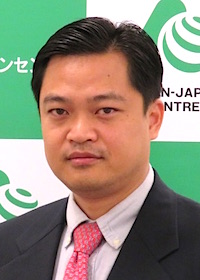 Vathouniyom Douangmala
Vathouniyom Douangmala
Director, Tourism & Exchange
ASEAN-Japan Centre, Tokyo
Young Leaders Program (’11)
Please tell us about your career path so far. What is your area of specialization and how did you come to work in this area?
I was appointed as Director of the Tourism & Exchange Division of the ASEAN-Japan Centre (AJC) based in Tokyo, on April 1, 2016. For this post, I have been seconded by the Lao government for a fixed 3 year-term.
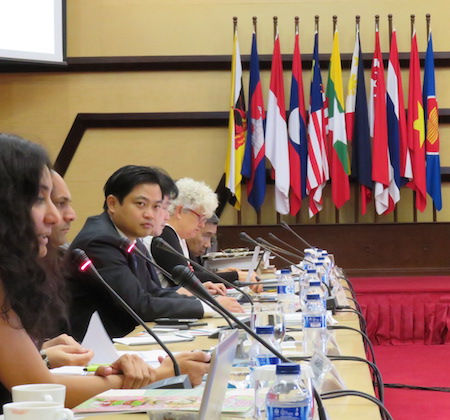
Head of the ASEAN-Japan Centre delegation at an ASEAN meeting
Before taking up this position, I spent 17 years as a career diplomat serving in various positions under the Ministry of Foreign Affairs of Laos, including my most recent position as Counselor cum Director of Asia and Europe Meeting (ASEM) Division, at the Department of Economic Affairs. My only posting overseas was at the Embassy/Mission of Laos in Paris, France from February 2004 to December 2007, as Third Secretary in Charge of Protocol and Personal Assistant to the Ambassador.
From January 2003 to February 2004, I was a secretary to the Deputy Prime Minister and the Minister of Foreign Affairs, who was also the Chairman of the National Organizing Committee of the ASEAN Tourism Forum and the 7th ASEAN Tourism Ministers’ Meeting when Laos hosted the event, which was a great opportunity for me to gain experience on the ASEAN tourism industry.
I was going through the selection process by the AJC management together with other candidates from the same Ministry and the Ministry of Tourism before I acquired the final nomination approval to the post.
In your current position as Director of Tourism & Exchange Division ASEAN-Japan Centre in Tokyo, what are your main responsibilities and duties?
I am in charge of vitalization of tourist traffic and expansion of personal exchanges between the ASEAN member states and Japan.
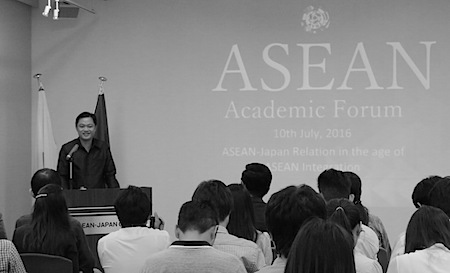
Keynote speaker and panelist at the ASEAN Academic Forum, July 2016 in Tokyo
In cooperation with the ASEAN Secretariat and the ASEAN National Tourism Offices, I manage the division to promote the ASEAN member states as attractive travel destinations through domestic public relation activities and the provision of tourism information using a variety of channels and means. We organize seminars and training activities for tourism stakeholders in Japan as well as in the ASEAN region. Likewise, we conduct activities to familiarize new ASEAN tourism fascinations to the Japanese travel industry and consumers. In response to the recent growing tourists flow from ASEAN, my division also conducts cultural events to entice inbound tourism from ASEAN member states to Japan.
Apart from tourism, we sponsor personal exchanges between ASEAN countries and Japan in various fields, from female entrepreneurs to children and youths. Exchange activities also include traditional events to foster mutual understanding between the peoples of ASEAN and Japan.
What are some of the biggest challenges you face in your work? And what have been the most interesting or rewarding aspects of your career thus far?
As we are in the middle of the Centre’s reform process, my biggest challenge is how to manage my division proficiently in order to realize the strategic vision “A regional centre of excellence in trade, investment, tourism and exchanges of persons”, by observing the following reform principles:
- Avoid duplication: enhancing core competence and uniqueness to differentiate our activities from other agencies of Japan
- Design and implement outcome-based programs: producing results-oriented outcomes and solutions
- Measure the impact: applying the SMART indicators (Specific, Measurable, Achievable, Relevant, Time-bound) for collecting testimonials and assessing the effectiveness and impacts.
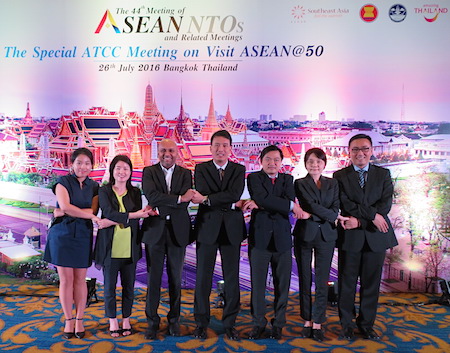
Attending the ASEAN National Tourism Organisations meeting in Bangkok, July 2016
Thus far, I have been learning how to have an effective performance management process that supports the organization, employee performance, development and success for which I need to get everyone in my division involved.
I understand that by having engaged and informed all staff members will eventually result in higher commitment and contribution rates and better quality performance management.
In your current capacity, what do you see as the main opportunities and challenges for the ASEAN – Japan relationship over the course of the next five to ten years?
ASEAN is becoming one of the most popular destinations for Japanese tourists. Last year 2015, about 4.7 million Japanese traveled to the region to enjoy its beautiful nature and experience the authentic cultures, World Heritage Sites, and other attractions. Among people in ASEAN countries, Japanese pop culture such as anime and “J-pop” music is very popular. Learning the Japanese language is also becoming more popular especially in Laos, Indonesia, Thailand, and Viet Nam. There is a big increase in the number of students from the region studying in Japan and the number of ASEAN visitors to Japan is also rising sharply, exceeding 2.1 million people for the first time last year, partly due to relaxed visa requirements for ASEAN citizens by the Japanese government.
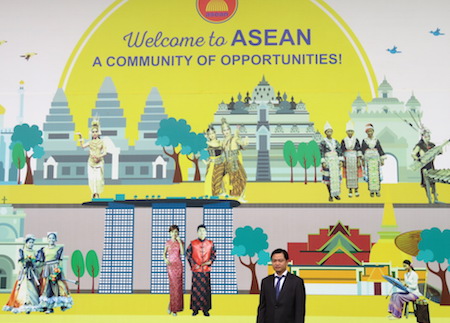
Visiting the ASEAN Secretariat in Jakarta, June 2016
Bilaterally the ASEAN-Japan relationship has developed over the past 43 years. I believe that the more economic integration in the region will contribute to a remarkable economic growth. Behind this growth, there has been an indispensable economic partnership between Japan and the ASEAN members. Therefore, I assume that for the foreseeable future Japan would remain ASEAN’s third largest trading partner and the second largest source of FDI. More importantly, ASEAN and Japan have already committed themselves to double trade and investment flows by 2022. Likewise, the significance of the ASEAN-Japan Comprehensive Economic Partnership (AJCEP) would deepen further bilateral and multilateral relations and economic integration. Among others, for instance, there would be more people-to-people contacts through various exchange programs under the ASEAN-Japan promotion activities and thus increase the mutual understanding between the peoples.
I am confident that Japan will remain an indispensible partner of ASEAN in its efforts to express its great potential by making use of its “diversity” and placing importance on “connectivity” improvement. The ASEAN-Japan relationship and the closer relations among business partners etc. would reinforce a more rapidly integrated ASEAN functioning as a hub of regional cooperation. This is very important not only for the ASEAN region itself but also for the stability and prosperity of Japan and all of East Asia. So it would be valuable to all stakeholders if we support the ASEAN’s efforts to enhance its connectivity and integration in the next five to ten years ahead.
What led you to GRIPS? What was the most important thing you learned while here, and how has your experience at GRIPS prepared you for future endeavours?
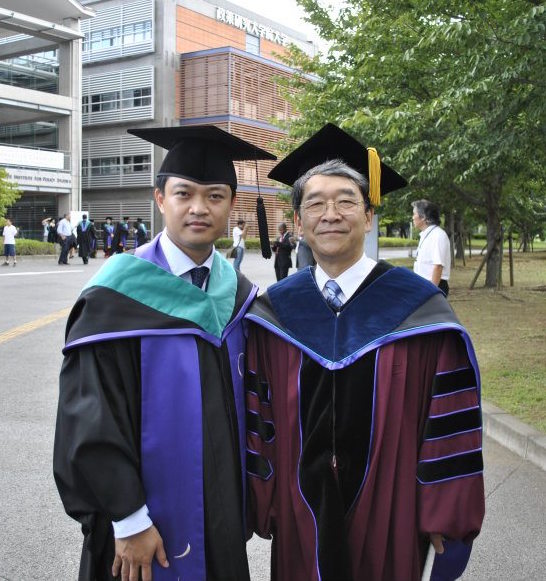
Together with YLP Program Director Masahiro Horie at the GRIPS Graduation Ceremony, September 2011
My motivation was to complete a Master degree in Public Policy in Japan and GRIPS-YLP was my first choice.
My most valuable and thoughtful lesson was the phrase “First Chance Last Chance” from Prof. Masahiro Horie. This philosophy, meaning that whenever given an opportunity, no matter how big, small or important, we should always try our best to accomplish the given mission. This has been the most valuable lesson for my professional and personal life advancement. Other impressive life experiences in Japan have contributed to me developing social skills, respect, self-worth, empathy, and realizing my own potential. The leadership and management skills I learned about when we were in crisis after the Tohoku earthquake and tsunami on March 11, 2011.
In order to realize my professional goals, I have been trying my best to apply all skills acquired at GRIPS on how to deliberate and manage all opportunities, means and resources efficiently by taking the following actions:
- Set clear goals and objectives with my organization and colleagues from the start of the assignment and from the start of any new task.
- Get organized: prioritizing urgent tasks, dealing with short requests quickly and putting less pressing matters on a to-do list.
- Pay attention to maintain a more streamlined workflow.
- Put myself in the mindset of team spirit, forging strong relationships with superiors, colleagues and outside of my immediate area of responsibility.
- While listening to the management team carefully when receiving any assignment, I also pay close attention to all co-workers.
What are some of your fondest memories of your time spent at GRIPS?
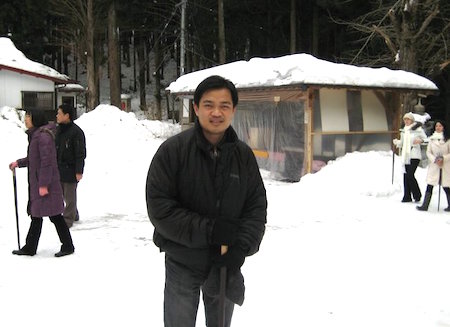
Field trip to Iwate prefecture in Northern Japan just before the earthquake and tsunami struck the region, February 2011
Some of the most memorable moments in my life have occurred in GRIPS. Getting support from faculty members particularly my thesis advisor Prof. Yonosuke Hara and all staff members, joining GRIPS’ activities and field trips, including the GRIPS’ marathon, when I could encounter real life and study situations.
What do you miss about Laos and what do you like most about living in Tokyo? Has Tokyo changed since you completed the Young Leaders Program at GRIPS in 2011?
Although I have no problem to have Japanese food for every meal, I nonetheless miss my Lao spicy flavors sometimes.
Yes, Tokyo has slightly changed since 2011 and many things have changed for the better. Efforts are being undertaken to improve life quality and to prepare for welcoming visitors to the Tokyo Olympic Games in 2020.
How do you maintain a balance between your work and the rest of your life? And what is your favorite thing to do when you are not working?
Here are five ways that I usually practice to bring more balance to my daily routine:
1. Always have some breaks between my scheduled appointments and activities
2. Drop activities that waste my time or energy
3. Consideration on my shopping
4. Get moving while working
5. Have sufficient rest
My favorite hobbies are travelling, cooking and networking activities.
If you could give one piece of advice to anyone considering studying at GRIPS what would it be?
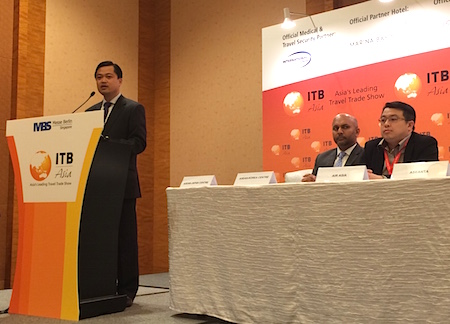
Giving a talk during the recent Messe Berlin travel trade show in Singapore
Well, I would say that GRIPS is one of the best graduate schools in Japan. To learn more about GRIPS you can find all related information you need from its website and if you need more in-depth information try to get it from the alumni.
Before coming to Japan, I would suggest you to learn as much as possible about the country culture and living in Tokyo and skills on how to perform well in academics.
How would you like to maintain involved with the School? What do you expect from GRIPS as an alumnus and do you have any suggestions on how to further utilize the GRIPS alumni network?
The GRIPS alumni network is well established. It makes people involved and connected. This is a great platform where we can share information and learn from each other beyond our studies and professional lives. This is probably one of the most valuable assets of GRIPS.
The alumni network may offer its members more access to a greater alumni directory, and organize career-related events and programs, and clubs and regional chapters to keep graduates connected with each other. Another possible suggestion is to use data from the Voluntary Support of Education survey in which most universities in Japan and around the world participate in. By jointly conducting this survey with other universities in Japan, GRIPS may collect more invaluable information on the alumni’s interests, professional activities, and preferences. With this data, GRIPS could best communicate with and serve its incredible alumni. It is just a simple survey that encourage alumni members to share their thoughts, experiences, and accomplishments to help share and inform inter programming and initiatives among the universities.





